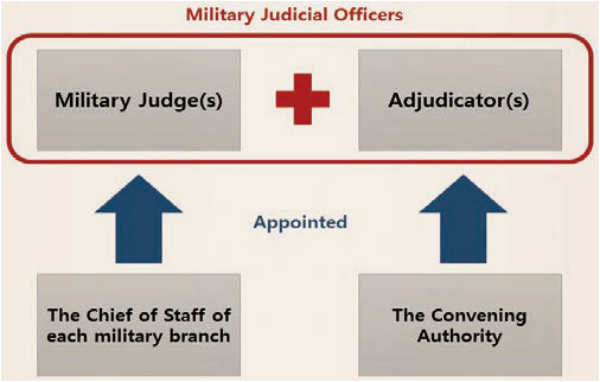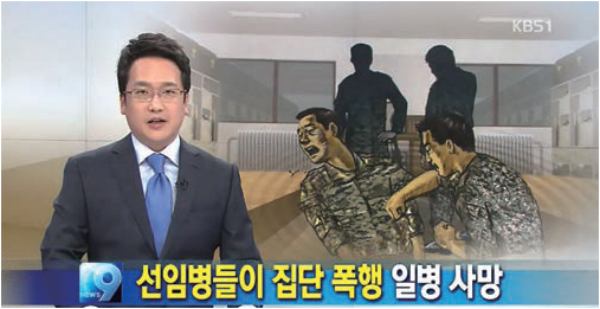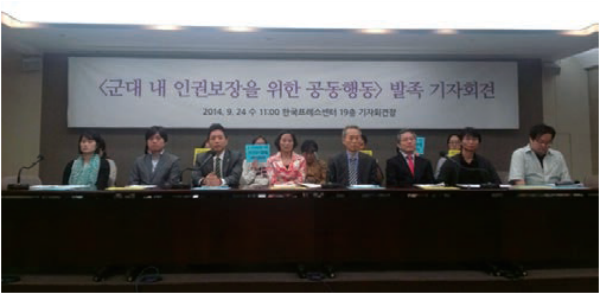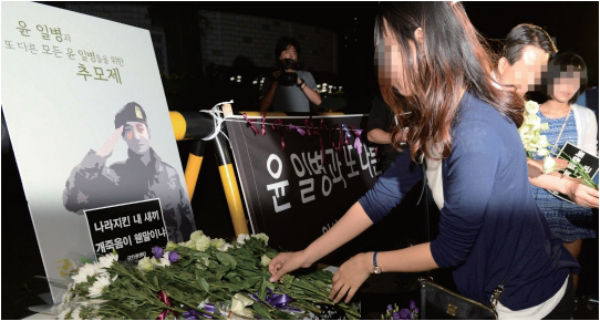Many Kingos might have heard about serious crimes in the military such as the death of "Private Yoon" which was caused by horrendous bullying and abuse by his fellow soldiers. Not only have such incidents become an issue in Korea, but the legitimacy of the judgments behind has become a hot issue. Followed by controversies surrounding this issue, the adjudicatory system in military courts will become virtually nominal from this July. The Sungkyun Times (SKT) now analyzes several problems of the previous military tribunal system, and introduces what the meaningful changes after amendment will be.
What is a ‘Military Tribunal’?
According to the Military Court Act in Korea, military tribunals are designed to deal with military crimes committed by a domestic or foreign person. Especially in Korea, military courts have jurisdiction over offenses committed by members of the military, or by foreigners who have violated international laws in a time of war and that of peace. Military courts are comprised of two types of courts, general military courts and high military courts. Basically, general military courts judge the cases clarified in law as a court of first instances, while the high military court judges manage appeals or complaints against general military court judgments. If needed, the Supreme Court shall judge appeals against military court judgments. Before the amendment, a general military court mostly consisted of three military judicial officers including one adjudicator, while the high military court consisted of three military judges along with two adjudicators if needed. Military judges were appointed by the Chief of Staff of each military branch or sometimes by the Minister of National Defense from among the military judge advocates under his or her control.

Although military tribunals are necessary in Korea under the military confrontation with North Korea and the conscription system, this kind of appointment system has been criticized for a long time due to several problems caused by its unfairness.

Background and Contents of Amendment
Problems of Previous Military Tribunal System
- Abuse of Power Based on Severely Hierarchical Cultures in Military
In the previous system, military judges were randomly nominated by the convening authority among commissioned officers who are thought to be virtuous and well-cultured. There is no restriction for appointment, so anyone can be appointed as a military judge at a convening authority’s discretion. Due to this irrational process of appointment, the right to be judged impartially, which is specified in the Constitution, is infringed and brings up matters of fairness and reliability of the tribunal system. The structure of the system allows the convening authorities to randomly decide on a Change of Assignment (COA) since its term is not guaranteed officially. As a result, such an authoritative structure exerts a big influence on the process of judgment and the transparency of it. Moreover, the hierarchical ranks of adjudicators are generally higher than those of military judges. According to the previous Military Court Act, senior military judicial officers, mostly adjudicators, became the presiding judge. Therefore, there is always a possibility of reaching a different verdict among adjudicators from what was mutually consented with military judges. It means that extremely hierarchical culture in the military causes military judges to hesitate to question the adjudicators’ opinions.

An incident that showed this problem occurred in 2011 when an officer who was in charge of a gunnery exercise fired several dozens of rounds right beside a private as a pretext for training, and ruptured the private’s eardrums. All of the court except for an adjudicator whose rank was the highest in the court condemned the officer unanimously but only the adjudicator, the presiding judge at that time, proclaimed him to be innocent. As a result, the officer was declared not guilty. In a similar vein, it has frequently occurred that a commander becomes overly involved in the trial procedure and can abuse their official authority.
- Excessive Intervention of a Convening Authority during a Trial
In the past, there has been controversy on the uncertainty and arbitrary operation of jurisdictional power, because there has been too much interference in judgment or unreasonable exertion of influence by the convening authorities. Since adjudicators are nominated by the convening authorities before a trial, there is a possibility that the stance of the convening authorities can influence on the process of a case. Sometimes, for example, adjudicators have a tendency to reach a biased verdict depending on the convening authorities’ opinions. The convening authorities also have the confirmation procedure that allows them to appoint an officer whose rank is generally higher than military judges as a presiding judge and even reduce sentences. This structural problem of the military tribunal system would bring about the tendency of subordination of military tribunals and adjudicators to convening authorities. Actually, about 75% of presiding justices do not have any trial experience, but are arbitrarily appointed by divisional convening authorities.
Contents and Expected Effects of Amendment
In order to solve the problems described above, an amendment of the Military Court Act will be enforced from July 7th. One of the most remarkable changes will be a virtual abolishment of adjudicatory system. Unlike before, when adjudicators took part in most cases, the amendment limits the scope of adjudicators to certain cases which require a high level of knowledge of law and military experience. Moreover, adjudicators can only be appointed with an approval by the Minister of National Defense or the Chief of Staff of each military branch. With such strict boundaries, the right of the convening authority is limited to less than one-third of its previous scope. The amendment is expected to significantly increase the fairness and independence of military tribunals with the following effects. Firstly, since it specifies the ranks and guarantees reappointment of military judges, the process of military tribunals would become more fair and efficient. In addition, military judges would not be expelled nor suspended by the convening authority without being sentenced. Therefore, judges will be able to reach a verdict without chaos or instability. Finally, unlike before when military members with lower ranks could not raise their voice, the amended Military Court Act is expected to tighten discipline in the military and to guarantee the rights of soldiers including female soldiers in need.
Significant Features of the Amendment
This amended Military Court Act has some positively improved elements, thus, gives us implications on the way to go.
Social Significance
A debate on the abolition of a convening authority system and adjudicatory system has been continuously discussed since 2004, but it floundered due to dissent from the Ministry of National Defense and a mutual agreement between opposing parties at the time. The Ministry of National Defense has asserted that the adjudicatory system itself cannot be abolished because of maintenance of order in the military, as well as the efficiency of a military tribunal. The Military Court Act, however, was revised and the revision will be applied from July 7th, 2017. This is meaningful in that the Ministry of National Defense and the National Assembly finally reached middle ground on the debate. As mentioned above, there have been several discussions about an abolishment of the adjudicatory system for many years. Several social movements and institutional efforts for improving military human rights have been continuously plugged away at. For example, the Democratic Legal Studies Association (Delsa) wrote a thesis on the ‘Case Study for Abolition of Military Commission’ in 2008, studying several evils of military courts such as the jurisdictional systems or confirmation procedure. Also, the Civilian Military Watch launched the ‘Collective Action for Guarantee of Human Rights in the Military’ with 11 social organizations after the death from assault of a private in 2014. In fact, even with those movements, they cannot be considered as direct causes of amendment in that the revised version of the Military Court Act will be applied from 2017. Nevertheless, it is expected to reduce absurdity in military society with the reflecting requirements of civil society, as legislation was revised this time.

Most importantly, the rights of victims including servicemen will be guaranteed. The situation that the assailant gets unreasonably light punishment after a judge’s arbitrary decision can be prevented, and this now allows the court to sentence the assailant with a fair and reasonable punishment. Consequently, it contributes to transparency, professionalism, and independency of the operation of a military court, and finally resolves the problems of previous military tribunals. The rights of individual soldiers involving service women will be protected by establishing military discipline and strongly punishing severe vices in the military.
More Ways to Go
Likewise, the amendment of the Military Court Act has several significant features. However, since this amended Act is at an early stage, other supportive systems should be considered to be introduced as well.
- Strengthening Participatory Trials
According to the Military Court Act, jurors can also participate in a military tribunal if a defendant wants. They are selected from the members of the military with the same rank as the defendant’s. In this case, because of the long-standing hierarchical culture in the military, the excessive right of the convening authority still remains, which can result in completely unfair verdicts in trials. In the United States (US), however, it is banned by law to set the jurors in the same branch as the defendant’s, and the rules for the military jurors should be exactly the same as the ones for jurors in a normal criminal action. Likewise, participatory trials in military tribunals should also be guaranteed by law, and jurors in such trials should comprise of military members with various ranks.
- Guaranteeing the Rights of Both Defendants and Victims
Because the amendment is more focused on doing away with the adjudicatory system and reducing the right of the convening authorities, still the clauses to guarantee the rights of the military members are not enough. In military tribunals of the U.S., a defense attorney can attend to protect the rights of a defendant as in normal trials, and even the designation of a private attorney is allowed if needed. Korea also has a system where a public defender is designated if the defendant does not have a defense attorney on his or her side. It is, however, limited only to the defendants who cannot afford it, and the range of adopting a public defender system should be expanded so that all defendants can be equally tried no matter the financial situation. Additionally, participatory trials of victims should also be guaranteed as well in order to protect their rights.

Many people around us must serve in the military mandatorily, so we should care a lot about the structural matters of the military such as severe treatment or death caused through non-combat related incidents. It is obvious that a mere amendment of law cannot solve the problems entirely, but it can be the first step toward the improvement of irrationalities in the military. Structural and institutional efforts to get rid of the various evils in the military would be fundamental actions that can basically resolve the human rights issues that are still prevalent within the military today.
